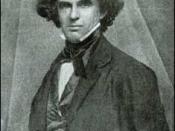Within a relatively small body of work, Nathaniel Hawthorne experimented with different forms and techniques of writing. He was self-taught and self-inspired. Hawthorne's works are deeply concerned with the ethical problems of sin and punishment. He created symbolic fiction through his shadowy and unreal characters. But Hawthorne's best characters revealed the sense of guilt he felt about the roles of his ancestors in the seventeenth century persecution of Quakers and witchcraft trials in Salem. In the true renaissance spirit, Nathaniel Hawthorne became one of the greatest writers in America-- perhaps in the world.
Nathaniel Hawthorne was born on July 4, 1804 in Salem, Massachusetts, a town of storytellers. He was the only son of a sea captain, one of a family of true hearted, New England Puritans. Hawthorne spent some of his time with a private tutor. He had hurt his leg while playing ball and walked with crutches. Though doctors could find nothing wrong, Hawthorne insisted that he could not possibly go to school.
Lots of well-to-do children had private tutors in those early days of the nineteenth century. So Hawthorne easily got his way in this matter. But for several years working with a tutor dominated his life. He had few friends and had little to do with his family. But after his father was lost at sea when he was only four, his mother, Elizabeth Hawthorne, moved into her father's home with Hawthorne and his sisters. Hawthorne's grandfather welcomed the little family and willingly took over their financial burdens. Still, Hawthorne's mother was unable to cope. During this time, his became overly protective and pushed Hawthorne toward more isolated situations. Hawthorne then realized his love of books; he read Pilgrim's Progress when he was only six years old. And as soon as he could possibly understand them,


